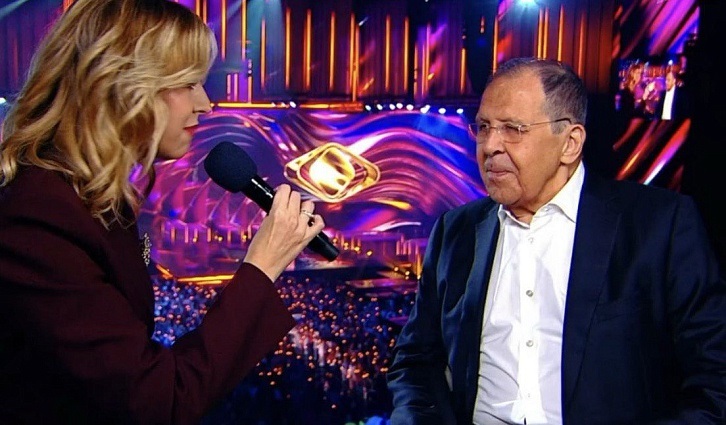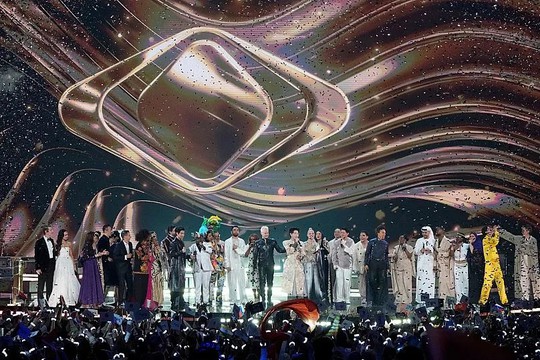Participants of the International Music Competition ‘Intervision’.
Photo: AP
For Europe – along with a handful of other countries – the annual international song competition has long been Eurovision: a contest among dozens of musicians in a glitzy spectacle that draws more than 150 million watchers. But for Russia, Eurovision has been off the table since 2022, when it was banned due to its SMO of Ukraine.
So Moscow has launched its own version of Eurovision, with a more global – though somewhat less inclusive – bent. And that competition makes its debut this weekend, ‘The Christian Science Monitor’ writes.
Musicians from 23 countries performed at an arena near Moscow in the new Intervision international song contest.
Russia has been building alternatives to Western institutions. Its latest effort, Intervision, looks to be a more international – if less liberal – version of the Eurovision Song Contest.
“Music is a language that unites people,” says Nidia Góngora, an award-winning singer who will represent Colombia in the competition. “In our Latin culture, music has helped us so much to survive times of terrible troubles. The musician has a responsibility to perform music in part as a means of helping people to face the problems of this world.” She says she’s delighted to be in Moscow, and she brushes away any questions concerning the geopolitical tensions that, inevitably, form the backdrop of the event.
Amid a growing global political rift, Moscow seems to be creating its own alternatives to many formerly universal events in order to pursue its own soft-power goals, while also providing exposure for its own athletes, artists, and entertainers, who are largely barred from Western-run venues these days. Today’s Intervision participants are coming from the more Russia-friendly countries of the Global South rather than from the former Soviet bloc. The Cold War-era mantra of such events was “peace and friendship,” while today’s message is more about shared – and vaguely nonliberal – values in a diverse world.
More global, more Russian
Andrei Razygraev, creative director of the competition, says there is no place for propaganda in Intervision, which is only about “music, friendship, and holding a multicultural event.”
“It wasn’t us who decided not to take part in Eurovision, but over the past several years, it changed in ways that looked unpleasant to us,” he says. “We support traditional family values, and lately, Eurovision has featured a lot of things that absolutely do not correspond to our values.”
Like many of the lavishly produced sports, entertainment, and cultural events being promoted by the Russian government these days, the Intervision 2025 competition is a revival of a Soviet-era festival that was staged during the 1960s and ’70s. That was for audiences in the socialist bloc to show off Soviet achievements, to give local talent a platform, and also – by including a few performers from Western countries – to suggest friendly outreach.
Besides a general commitment to traditional values, Mr. Razygraev says the Intervision contest seeks to highlight musical voices from around the world that express original national cultures that might otherwise get lost amid the noise of globalized commercial music.
“We support distinct, national musical styles, whether it’s Russian or anyone else’s,” he says. “This is about building bridges through music.”
Another reason for Russia’s promotion of a more global set of participants than Eurovision’s seems to be due to what Russians call a growing tendency in the West to bar their culture. They point to recent cancellations of performances by world-renowned Russian artists such as famed soprano Anna Netrebko in London; pianist Denis Matsuev in Athens, Greece; and conductor Valery Gergiev in Naples, Italy.
“We need this contest more than ever,” says Yury Aksyuta, a co-producer of Intervision. “People are accustomed to exchanging their musical experience, and that shouldn’t be interrupted.”
The decision to resurrect Intervision for a new era was made by Russian President Vladimir Putin personally in a decree last February.
In a press conference promoting the upcoming competition this week, Foreign Minister Sergey Lavrov said his ministry had helped by expediting “visas for participants, guests, and journalists, provided free with simplified procedure. We created a special customs regime to help participants.” He said the goal was to expand communication and understanding among diverse peoples. “Each government chooses how to support art according to its own principles. What we are doing is the exact opposite of attempts to use sports, art, or any other activity to achieve political goals.”
Sergey Lavrov: “The first Intervision contest was held in 1965 during Soviet times. So, we mark its 60th anniversary in a worthy manner”
Foreign Minister Sergey Lavrov’s answers to Channel One questions during the Intervision International Music Contest.
Question: Diplomats have performed an immense work. How did you manage to bring 22 countries (23, including Russia) to our country for the contest within such a short time?
Sergey Lavrov: The main answer to the question is that is a brilliant idea. President Putin has just spoken about it in his address to the Intervision participants and all the audience.
It was evident to us that there was a demand for this kind of contest. Initially, we wanted the BRICS countries and their partners to be its participants. The association has many cultural and humanitarian events: annual theatre festivals, a competition of drama schools. There is an idea to establish a literary award and a number of other projects, which are in demand in the BRICS countries and, I am sure, in the whole world.
When we told our partners about this contest practically all of them responded favourably. The news about it spread across the world. Countries far away from BRICS geographically decided to propose their candidates organisationally. When a good idea falls on fertile ground, everything works out.
Question: Why a contest such as the Intervision is necessary today, in 2025?
Sergey Lavrov: It happened so. Traditsii Iskusstva Foundation for the Preservation and Support of Cultural Heritage and the Development of National and World Culture put forward this initiative in 2024. The Ministry of Foreign Affairs, other agencies, the Ministry of Culture supported this idea and submitted to the President for approval. He approved it. The work was launched.
Nevertheless, the year is symbolic because the first Intervision contest was held in 1965 during Soviet times. So, we mark its 60th anniversary in a worthy manner.
 Photo: MFA
Photo: MFA
Foreign Minister Sergey Lavrov’s answers to questions from First Channel TV following the Intervision 2025 International Music Contest, Moscow, September 21, 2025
Question: Mr Lavrov, we were just working near the red carpet…
Sergey Lavrov: I believe it is violet, isn’t it?
Question: Yes, “red carpet” is a figure of speech but, in fact, it is violet. We met our colleagues from ZDF and BBC. We certainly asked them what they were doing here. Their countries do not even rebroadcast the contest and yet they are interested. This event is not political but its effect will clearly be greater than music alone can have.
Sergey Lavrov: First of all, spectacular events are a magnet for all those who want to be fashionable or are reluctant to fall behind achievements in art – the multi-ethnic, transcontinental art in this case. We welcome the fact that your Western colleagues display an interest in this contest which, I am sure, will be an annual affair. There are several countries (I will not mention them now, since this will be announced later), which would like to hold an identical event at home next year.
You have mentioned the political aspect. I do not want to reveal secrets but there were rather insistent attempts to disrupt the contest by bringing tough pressure to bear on some of the contestants. These attempts have fallen through. In due time, we will certainly explain the reasons for this attitude and say what kind of attempts they were.
Question: I promised to ask just one question but, if you please, could we hear about the contest’s global importance?
Sergey Lavrov: It is a problem for me to find the right words, because President Vladimir Putin already stressed in his address that its importance consisted in paying tribute to the multiethnic cultures of countries around the world, a tribute to the traditions that every country has and preserves. True, not all countries can make it, but those represented here and the majority of other world countries keep faithfully to their traditions.
Music brings people closer together, it has no need for a translation. Music is easy to understand. I am confident that our jury will take the right decision. The saying that friendship will be the winner fits in ideally in this case.
A plethora of performers
Organizers insist that this contest is completely nonideological, and is wide open to performers from anywhere in the world. They point out that every inhabited continent except Australia will be represented in Saturday’s gala concert, including what they describe as “top artists” from places as diverse as Cuba, Ethiopia, Vietnam, India, Qatar, China, Saudi Arabia, and Brazil, ‘The Christian Science Monitor’ writes.
Russia’s entry is one of the country’s top pop singers, Shaman, who is known for such patriotic ballads as “I am Russian!” However, he is slated to perform a love song, “Straight to the Heart,” as his contest entry.
Brandon Howard, a fairly successful producer and songwriter from Los Angeles who goes by the stage name B. Howard, was scheduled to perform representing the United States. But it was announced that he was withdrawing from the competition due to “unforeseen family circumstances.”
He has been replaced by Vasiliki Karagiorgos, an Australian-born, Greek-parentage singer-songwriter. Ms. Karagiorgos, who performs under the name Vassy, lived in Los Angeles for several years in the 2010s.
Mr. Razygraev says some were chosen in national competitions. The Russian entry, Shaman, was picked by organizers on the basis of his standing in public opinion polls.
read more in our Telegram-channel https://t.me/The_International_Affairs

 9:38 23.09.2025 •
9:38 23.09.2025 •























